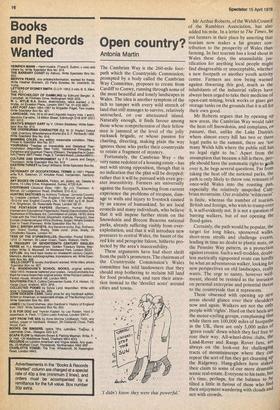Open country?
Antonia Martin
The Cambrian Way is the 260-mile footpath which the Countryside Commission, prompted by a body called the Cambrian Way Committee, proposes to create from Cardiff to Conwy, running through some of the most beautiful and lonely landscapes in Wales. The idea is another symptom of the itch to tamper with every wild stretch of land that still manages to survive, relatively untouched, on our attenuated island. Naturally enough, it finds favour among those whose comprehension of their fellow. men is jammed at the level of the jolly' rucksack brigade, or whose passion for charting, directing, making plain the way ignores those who prefer their countryside to retain a fragment of mystery.
Fortunately, the Cambrian Way the very name redolent of a housing estate has met with strong opposition, though that is no indication that the plan will be dropped: rather that it will be pursued with even greater insensitivity. Farmers are universally against the footpath, knowing from current experience the problems of trespass, damage to walls and injury to livestock caused by an excess of humankind. So are local councils and many individuals, who believe that it will impose further strain on the Snowdonia and Brecon Beacons national parks, already suffering visibly from overexploitation, and that it will introduce new pressures to central Wales, the haunt of the red kite and peregrine falcon, hitherto protected by the area's inaccessibility.
These arguments have had short shrift from the path's promoters. The chairman of the Countryside Commission's Wales committee has told landowners that they should stop bothering to reclaim hill land for food production, and turn their attention instead to the 'derelict acres' around cities and towns. Mr Arthur Roberts, of the Welsh Council or the Ramblers Association, has also
added his mite. In a letter to The Times, he
put farmers in their place by asserting that tourism now makes a far greater con tribution to the prosperity of Wales than farming. In fact tourism has a loud shout in Wales these days, the unassailable jus tification for anything local people might find disagreeable or unacceptable, whether a new footpath or another youth activity centre. Farmers are now being warned against thwarting this god, much as the inhabitants of the industrial valleys have always been urged to take their medicine of open-cast mining, brick works or giant gas storage tanks on the grounds that it is all for their own good.
Mr Roberts argues that by opening up new areas, the Cambrian Way would take the heat off Snowdonia, and complains, en passant, that, unlike the Lake District, where almost every hill has two or three legal paths to the summit, there are 'too many Welsh hills where the public still has no legal right to be.' Apart from the assumption that because a hill is there, people should have the automatic right to balk over it, he begs several questions. Far from taking the heat off the national parks, the path is only likely to throw one remnant of once-wild Wales into the roasting pan, especially the relatively unspoiled Cant bnan mountains. Our available 'wilderness' is finite, whereas the number of tourists, British and foreign, who wish to tramp over it, is self-evidently not. It is not a question of barring walkers, but of not opening the flood-gates.
Certainly, the path would be popular, the target for long hikes, sponsored walks, short-term strolls and challenge events, leading in time no doubt to plastic mats, on the Pennine Way pattern, as a protection against erosion. Such a well-trodden, doubtless metrically signposted route can hardlY be what an adventurous walker, looking for new perspectives on old landscapes, really wants. The urge to nanny, however well meant, should be resisted as the intrusion on personal enterprise and potential threat to the countryside that it represents.
Those obsessed with opening up new areas should glance over their shoulders now and again. Walkers are not the only people with 'rights'. Hard on their heels are the motor-cycling groups, complaining that while there are 100,000 miles of footpaths in the UK, there are only 3,000 miles of 'green roads' down which they, feel free to roar their way. All-wheel-drive 'Clubs, the Land-Rover and Range Rover fans, are always on the look-out for challenging tracts of mountainscape where they Can repeat the sort of fun they get churning up the Ridgeway. Hang-gliders have staked their claim to some of our more dramatic scenic real-estate. Everyone to his taste, but it's time, perhaps, for the balance to hP, tilted a little in favour of those who find their enjoyment wandering with clouds and not with crowds.


































 Previous page
Previous page